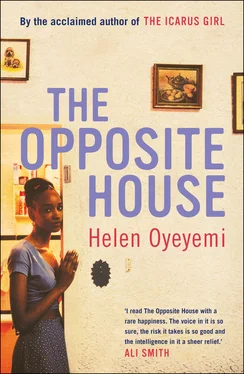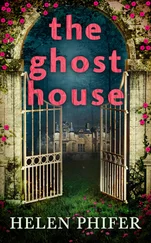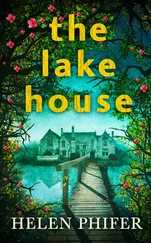Helen Oyeyemi - The Opposite House
Здесь есть возможность читать онлайн «Helen Oyeyemi - The Opposite House» весь текст электронной книги совершенно бесплатно (целиком полную версию без сокращений). В некоторых случаях можно слушать аудио, скачать через торрент в формате fb2 и присутствует краткое содержание. Год выпуска: 2008, Издательство: Bloomsbury UK, Жанр: Современная проза, на английском языке. Описание произведения, (предисловие) а так же отзывы посетителей доступны на портале библиотеки ЛибКат.
- Название:The Opposite House
- Автор:
- Издательство:Bloomsbury UK
- Жанр:
- Год:2008
- ISBN:нет данных
- Рейтинг книги:4 / 5. Голосов: 1
-
Избранное:Добавить в избранное
- Отзывы:
-
Ваша оценка:
- 80
- 1
- 2
- 3
- 4
- 5
The Opposite House: краткое содержание, описание и аннотация
Предлагаем к чтению аннотацию, описание, краткое содержание или предисловие (зависит от того, что написал сам автор книги «The Opposite House»). Если вы не нашли необходимую информацию о книге — напишите в комментариях, мы постараемся отыскать её.
The Opposite House — читать онлайн бесплатно полную книгу (весь текст) целиком
Ниже представлен текст книги, разбитый по страницам. Система сохранения места последней прочитанной страницы, позволяет с удобством читать онлайн бесплатно книгу «The Opposite House», без необходимости каждый раз заново искать на чём Вы остановились. Поставьте закладку, и сможете в любой момент перейти на страницу, на которой закончили чтение.
Интервал:
Закладка:
The girl stammered and fiddled with her tie-dyed head wrap. People started hissing disagreement with Amy Eleni. Amy Eleni and I hissed back. Isn’t living in your country the best way to show that you think it worthy of love? You choose to live in a country because there’s something there that makes it better than anywhere else. You set your daily life down regardless of the restrictive conditions. It’s the same sort of thing Clarence talks about in True Romance — he says real love is remaining loyal when it’s easier, even excusable, not to.
The talk about Nigerian independence continued. Amy Eleni sighed and wrote a long note in small letters on her hand. The note was so long that she had to take my hand to write on, too, and we could only read her note to me by placing our biro-splotched palms alongside each other. The note said:
You know what, if you want to talk about your original country, if you want to be serious about it, fine. But you don’t need to pretend that you love the place. People need to stop using love of some country that they don’t live in as an excuse for their inability to shut up about it .
We kept the note on our hands all day, smiling enigmatically and turning our hands palms-down when other girls wheedled, ‘Let me see.’
Dominique was at home sick the day Lucy came up to me at registration, peeped at me through heavy lashes and said, ‘You know, a lot of the others have been saying that out of you and Dominique, we like you better. You’re all right. You’re roots.’
I must have seemed stupid to her. I said, ‘Huh?’ I thought a black girl was a black girl. Why did it come down to a choice between me and Dominique, and not any of the other girls? Then I got it; we were both black without coming from the right place. We were the slave girls from Trinidad and Cuba; not supposed to speak Spanish, not supposed to speak English either. I wanted to curse Lucy Cuban-style, but I was afraid she’d understand; she was predicted an A star for GCSE Spanish.
Tonight I am singing a set at a café whose poetry-night theme is ‘Solitude’. They’ve asked me to start with my three least-favourite songs: ‘In my Solitude’, ‘Black Coffee’ and ‘Misty Blue’. When Michael from the band called to tell me about it last week, he anticipated my response, chanting ‘Oh, whine, whine, whine,’ along with me. ‘Don’t worry about it — next week it’s Ronnie Scott’s, with our own songs. .’
I hastily assemble my things so that they’re in the general vicinity of the full-length bedroom mirror — make-up bag, a selection of black stiletto heels, armfuls of dresses on hangers, hair tongs tangled in their own plug lead, sheer tights that are to the best of my knowledge unladdered. Aaron’s side of our dresser is analytically tidy: a small city of glass-bottled gift colognes and sable-backed hairbrushes, mostly unused, alongside a depleted bundle of the tough, dried-wood chewing sticks he swears by — my teeth ache just looking at them. The only things on his bedside table are a water glass and a photograph of him and his best friend, aged ten. In the picture Geoffrey is cola-dark, with astonishing, vine-like sideburns. Aaron is defiantly pale and chubby-cheeked; his hair is slicked into some attempt at a Jheri curl. They both have carelessly gappy smiles; they stand together in a heaving Accra sidestreet swept with umber dust, against a battered blue backdrop that says ‘PepsiCo’.
I have yet to meet Geoffrey, who still lives in Accra. But the fact that Aaron always refers to him as ‘Geoffrey’, never ‘Geoff’ or ‘G’, makes me think of him as diffident and kind and slightly stuffy. A boy who felt the pressure of being a cabinet minister’s son and tried his best to behave himself, growing up into the kind of man who rolls his English around in his mouth as plummily as he can.
I strip to my underwear and study myself in the mirror; it is a bronzed sorrel woman with a net of curly hair who looks back, and she does not look Jamaican or Ghanaian or Kenyan or Sudanese — the only firm thing that is sure is that she is black. Mami says only Cubans look like Cubans; put three Cuban girls together — white, black Latina, whatever — and you just see it. It is as if you could take away my colouring and I would be a white Cubana — a white Cubana not being, after all, particularly white.
My eyes are long rather than wide, meagrely lashed and slanted unhurriedly upwards at their corners. In my blood is a bright chain of transfusion; Spaniards, West Africans, indigenous Cubans, even the Turkos — the Cuban Lebanese. My shape is that of a slightly distorted heavy pear; slender, Chabella-like shoulders and a gently rising collarbone cast lines that soften and swell past a high waist to what Amy and I refer to as ‘loot in the boot’ — hips that escape spread fingerspans — then the line returns.
I prod my thigh and, standing on one leg, run my hand down my calf. I sink to the floor, sink to the middle of this slew of things that are supposed to tease out, bejewel, enhance, improve on what I have. I coat my hands with cocoa butter and slowly, slowly start to reconcile myself with my skin, inch by inch. I am scared to touch my stomach, not because it is tender, but because it has begun to swell beyond the point where it can be comfortably rubbed with one hand. If I cup it with both hands the bump might rise to the space I allow it.
When Amy Eleni calls I am fiddling, trying to adjust the V-neck of my black dress so that it falls away from my shoulders and skims the arms left bare by my sleeveless polo neck.
‘Hey, Maja. I’m coming to hear you sing tonight after all,’ she says.
‘Good. How’s Jenny?’
‘I don’t know; we broke up.’
‘Oh?’
‘That’s all you’re getting on the phone. What of Aaron?’
‘He’s. . tired a lot, and out a lot.’
‘Can I place the first bet on when he’s going to pack the trainee-doctor thing in?’
‘Come on, Amy Eleni.’
‘No, you come on. It’s not like he needs to work. His dad is like, ker-ching.’
Before I can object, she asks, ‘What’s tonight’s theme?’
‘Of make-up, or the café?’
‘Both —’
I tell her: make-up, purple; café, solitude.
‘Solitude?’
Amy Eleni teaches A-level English Language and Literature; she has nothing but murder in her heart for amateur poets. She keeps telling me that most of them don’t read anyone’s poetry but their own, and that’s why they always think they’re doing something new, and why it’s always so appallingly not. I keep telling her that the people in her class are seventeen and eighteen and that she should give them a break. I remind her of her own amateur poetry at seventeen and eighteen and am told ‘Shut up! My poetry was never amateur!’
I hold my tights up to the light. They are laddered after all, and I have to hang up and look for another pair. Mami slips into the room with good-luck kisses for me and an opalescent white gardenia on a coiled green stalk. Before I can thank her she starts jabbing at my polo neck:
‘What is this? Why are you wearing this? That’s such a lovely dress, and you’re spoiling it —’
I am just trying to protect my throat. Before I realise what I’m doing I have taken her hands and pushed them back at her hard, too hard; she stumbles and laughs, astonished. I catch myself and take the flower from her.
‘Chabella,’ I say, ‘I can’t wear this. .’
Mami throws up her hands. ‘Your brother chose it. I told him it was ugly.’
Tomás, a pencil behind his ear, comes to look at me. ‘What’s wrong with it? Billie Holiday used to wear one, didn’t she? I thought you liked her? Are you off her now?’
Читать дальшеИнтервал:
Закладка:
Похожие книги на «The Opposite House»
Представляем Вашему вниманию похожие книги на «The Opposite House» списком для выбора. Мы отобрали схожую по названию и смыслу литературу в надежде предоставить читателям больше вариантов отыскать новые, интересные, ещё непрочитанные произведения.
Обсуждение, отзывы о книге «The Opposite House» и просто собственные мнения читателей. Оставьте ваши комментарии, напишите, что Вы думаете о произведении, его смысле или главных героях. Укажите что конкретно понравилось, а что нет, и почему Вы так считаете.












